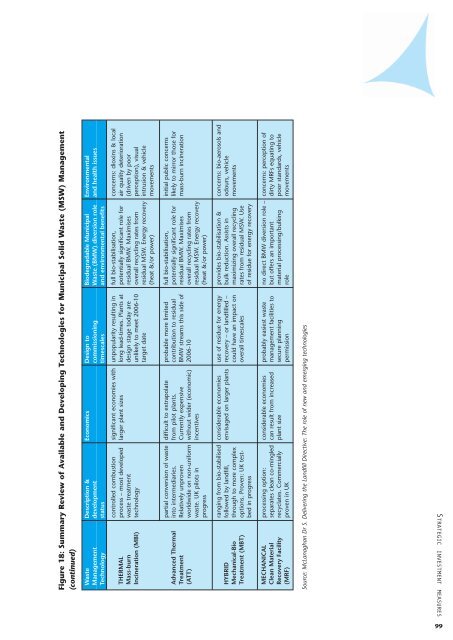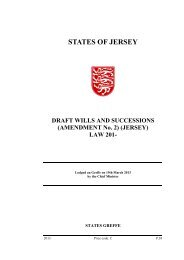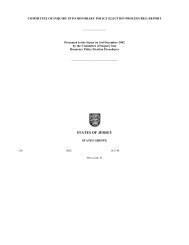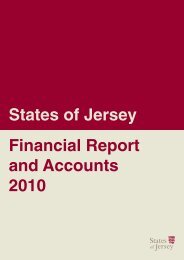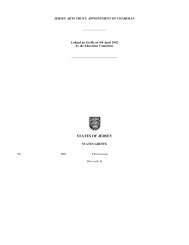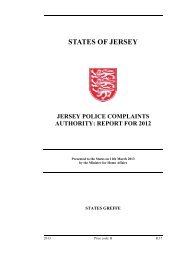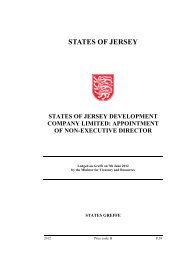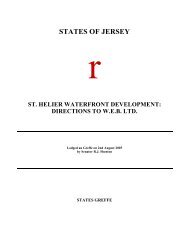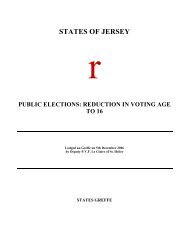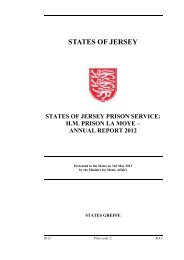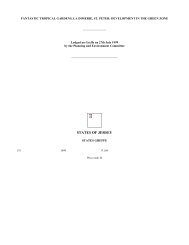Waste not want not - States Assembly
Waste not want not - States Assembly
Waste not want not - States Assembly
You also want an ePaper? Increase the reach of your titles
YUMPU automatically turns print PDFs into web optimized ePapers that Google loves.
Figure 18: Summary Review of Available and Developing Technologies for Municipal Solid <strong>Waste</strong> (MSW) Management<br />
(continued)<br />
<strong>Waste</strong> Description & Economics Design to Biodegradable Municipal Environmental<br />
Management development commissioning <strong>Waste</strong> (BMW) diversion role and health issues<br />
Technology status timescales and environmental benefits<br />
THERMAL<br />
Mass-burn<br />
Incineration (MBI)<br />
controlled combustion<br />
process – most developed<br />
waste treatment<br />
technology<br />
significant economies with<br />
larger plant sizes<br />
unpopularity resulting in<br />
long lead-times. Plants at<br />
design stage today are<br />
unlikely to meet 2006-10<br />
target date<br />
full bio-stabilisation,<br />
potentially significant role for<br />
residual BMW. Maximises<br />
overall recycling rates from<br />
residual MSW. Energy recovery<br />
(heat &/or power)<br />
concerns: dioxins & local<br />
air quality deterioration<br />
(driven by poor<br />
perception), visual<br />
intrusion & vehicle<br />
movements<br />
Advanced Thermal<br />
Treatment<br />
(ATT)<br />
partial conversion of waste<br />
into intermediaries.<br />
Relatively unproven<br />
worldwide on non-uniform<br />
waste. UK pilots in<br />
progress<br />
difficult to extrapolate<br />
from pilot plants.<br />
Currently expensive<br />
without wider (economic)<br />
incentives<br />
probable more limited<br />
contribution to residual<br />
BMW streams this side of<br />
2006-10<br />
full bio-stabilisation,<br />
potentially significant role for<br />
residual BMW. Maximises<br />
overall recycling rates from<br />
residual MSW. Energy recovery<br />
(heat &/or power)<br />
initial public concerns<br />
likely to mirror those for<br />
mass-burn incineration<br />
HYBRID<br />
Mechanical-Bio<br />
Treatment (MBT)<br />
ranging from bio-stabilised<br />
followed by landfill,<br />
through to more complex<br />
options. Proven: UK testbed<br />
in progress<br />
considerable economies<br />
envisaged on larger plants<br />
use of residue for energy<br />
recovery – or landfilled –<br />
could have an impact on<br />
overall timescales<br />
provides bio-stabilisation &<br />
bulk reduction. Assists in<br />
maximizing overall recycling<br />
rates from residual MSW. Use<br />
of residue for energy recovery<br />
concerns: bio-aerosols and<br />
odours, vehicle<br />
movements<br />
MECHANICAL<br />
Clean Material<br />
Recovery Facility<br />
(MRF)<br />
processing option:<br />
separates clean co-mingled<br />
recyclates. Commercially<br />
proven in UK<br />
considerable economies<br />
can result from increased<br />
plant size<br />
probably easiest waste<br />
management facilities to<br />
secure planning<br />
permission<br />
no direct BMW diversion role –<br />
but offers an important<br />
material processing/bulking<br />
role<br />
concerns: perception of<br />
dirty MRFs equating to<br />
poor standards, vehicle<br />
movements<br />
Source: McLanaghan Dr S. Delivering the Landfill Directive: The role of new and emerging technologies<br />
STRATEGIC INVESTMENT MEASURES<br />
99


